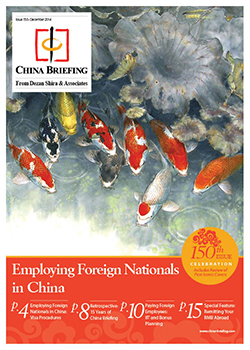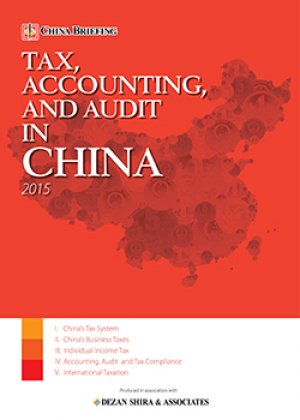Employing Foreign Nationals in China – New Issue of China Briefing Magazine
 The newest issue of China Briefing Magazine, titled “Employing Foreign Nationals in China,” is out now and available to subscribers as a complimentary download in the Asia Briefing Bookstore through the month of December. To subscribe to China Briefing and download this issue for free, please click here.
The newest issue of China Briefing Magazine, titled “Employing Foreign Nationals in China,” is out now and available to subscribers as a complimentary download in the Asia Briefing Bookstore through the month of December. To subscribe to China Briefing and download this issue for free, please click here.
Contents:
- Employing Foreign Nationals in China: Visa Procedures
- Retrospective: 15 Years of China Briefing
- Paying Foreign Employees: IIT and Bonus Planning
- Special Feature: Remitting Your RMB Abroad
Although some speculation has it that the population of foreigners working in China is in decline, our experience at Dezan Shira & Associates speaks otherwise, where questions regarding the individual income tax (IIT) liability of foreign nationals, as well as work visa procedures, continue to pour in at a steady stream.
As any foreigner who has been through the process will know, obtaining a work visa in China can be a twisting process of back-and-forth between multiple government agencies and forms of documentation. Meanwhile, the revised Entry-Exit Administration Law has created ongoing confusion regarding the available types of visas and their respective functions.
Taxation can be a wholly separate headache for foreigners and the companies that employ them, where determining one’s IIT liability involves a veritable calculus of residency periods, tax brackets and other criteria. It is therefore fitting that in this special edition 150th issue of China Briefing Magazine, we should return to the subject of the very second issue of China Briefing ever published, as recounted by Chris Devonshire-Ellis in the magazine centerfold.
In this issue of China Briefing, we have set out to produce a guide to employing foreign nationals in China, from the initial step of applying for work visas, to more advanced subjects such as determining IIT liability and optimizing employee income packages for tax efficiency. Lastly, recognizing that few foreigners immigrate to China on a permanent basis, we provide an overview of methods for remitting RMB abroad.
|
Asia Briefing Ltd. is a subsidiary of Dezan Shira & Associates. Dezan Shira is a specialist foreign direct investment practice, providing corporate establishment, business advisory, tax advisory and compliance, accounting, payroll, due diligence and financial review services to multinationals investing in China, Hong Kong, India, Vietnam, Singapore and the rest of ASEAN. For further information, please email china@dezshira.com or visit www.dezshira.com. Stay up to date with the latest business and investment trends in Asia by subscribing to our complimentary update service featuring news, commentary and regulatory insight. |
![]()
 Tax, Accounting, and Audit in China 2015 (7th Edition)
Tax, Accounting, and Audit in China 2015 (7th Edition)
This edition of Tax, Accounting, and Audit in China, updated for 2015, offers a comprehensive overview of the major taxes foreign investors are likely to encounter when establishing or operating a business in China, as well as other tax-relevant obligations. This concise, detailed, yet pragmatic guide is ideal for CFOs, compliance officers and heads of accounting who must navigate the complex tax and accounting landscape in China in order to effectively manage and strategically plan their China operations.
 Double Taxation Avoidance in China: A Business Intelligence Primer
Double Taxation Avoidance in China: A Business Intelligence Primer
In our twenty-two years of experience in facilitating foreign investment into Asia, Dezan Shira & Associates has witnessed first-hand the development of China’s double taxation avoidance mechanism and established an extensive library of resources for helping foreign investors obtain DTA benefits. In this issue of China Briefing Magazine, we are proud to present the distillation of this knowledge in the form of a business intelligence primer to DTAs in China.
 Strategies for Repatriating Profits from China
Strategies for Repatriating Profits from China
In this issue of China Briefing, we guide you through the different channels for repatriating profits, including via intercompany expenses (i.e., charging service fees and royalties to the Chinese subsidiary) and loans. We also cover the requirements and procedures for repatriating dividends, as well as how to take advantage of lowered tax rates under double tax avoidance treaties.
- Previous Article China Briefing Magazine Celebrates 150th Issue
- Next Article Investing in China’s Medical Device Industry, Part 2









